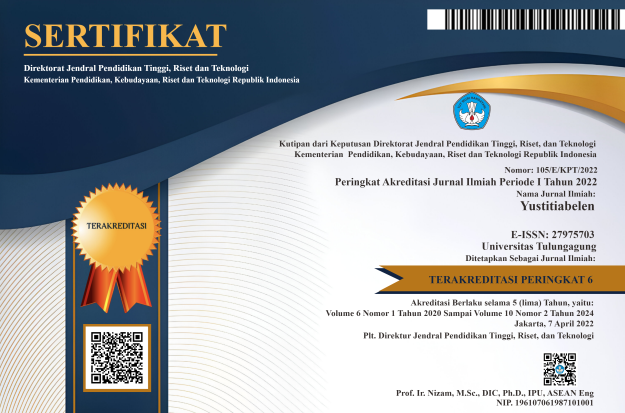Pemberdayaan Masyarakat Melalui Pengembangan Sektor Wisata
(Studi di Desa Pujon Kidul Kecamatan Pujon Kabupaten Malang)
DOI:
https://doi.org/10.36563/publiciana.v15i01.424Keywords:
Community Empowerment, Tourism Sector Development, Tourism VillageAbstract
The tourism sector is one of the most crucial categories that can support the community's economy and also support the country. In recent years, the tourism sector has been increasingly developed by various regions in Indonesia, especially in rural areas, one of which is the Pujon Kidul, Malang. The purpose of this research is to find out how the tourism industry can help empower local communities in Pujon Kidul Malang and to find out the socio-economic conditions of the community from before and after the development of the tourism sector. The research method used in this research is a descriptive qualitative research method. The data obtained in the form of primary data obtained through direct observation and interviews with research informants, as well as secondary data obtained through books, journals and documents related to the research topic. The sampling technique used by the researcher is a purposive sampling technique to take samples with certain considerations. The results showed that after the development of the tourism sector, there was an extraordinary development in Pujon Kidul. The community is empowered through the availability of UKM and UMKM as well as the availability of job opportunities through tourism. In addition, the development of the tourism sector in Pujon Kidul Village has brought a significant difference to the socio-economic conditions of the community before and after the development of the tourism sector.
Downloads
References
Undang-Undang Republik Indonesia Nomor 33 Tahun 2009 Tentang “Kepariwisataan,” (2009).
Persada, C. (2018). Perencanaan Pariwisata Dalam Pembangunan Wilayah Berkelanjutan. http://repository.lppm.unila.ac.id/id/eprint/13278
Pradana, G. Y. K. (2019). Sosiologi Pariwisata. In STPBI Press (Vol. 1, Issue 1). STPBI PRESS. www.academia.edu/42858001/Sosiologi_Pariwisata
Salim, & Syahrum. (2012). Metodologi Penelitian Kualitatif. Ciptapustaka Media.
Sistem Informasi Elektronik (SIE) Desa Pujon Kidul. (n.d.). Sistem Informasi Elektronik (SIE) Desa Pujon Kidul. https://www.sie.pujonkidul.desa.id/
Sugiyono. (2013). Metode Penelitian Kuantitatif, Kualitatif, dan R&D. Alfabeta.
Zanah, M. (2019). Analisis Sektor Pariwisata dalam Upaya Meningkatkan Pendapatan Masyarakat dan Kesempatan Kerja (Studi Kasus Obyek Wisata Koptan Ori Green Sendang Tulungagung). UIN SATU Tulungagung Institutional Repository, 1.
Zubaedi. (2013). Pengembangan Masyarakat: Wacana dan Praktik (p. 270). Kencana Prenada Media Group.
Downloads
Published
Issue
Section
License
1. Hak cipta atas artikel apa pun dipegang oleh penulisnya.
2. Penulis memberikan jurnal, hak publikasi pertama dengan karya yang dilisensikan secara bersamaan di bawah Lisensi Atribusi Creative Commons yang memungkinkan orang lain untuk membagikan karya dengan pengakuan atas kepenulisan dan publikasi awal karya tersebut dalam jurnal ini.
3. Penulis dapat membuat pengaturan kontrak tambahan yang terpisah untuk distribusi non-eksklusif dari versi jurnal yang diterbitkan dari karya tersebut (misalnya, mempostingnya ke repositori institusional atau menerbitkannya dalam sebuah buku), dengan pengakuan dari publikasi awalnya di jurnal ini.
4. Penulis diizinkan dan didorong untuk memposting karya mereka secara online (misalnya, di repositori institusional atau di situs web mereka) sebelum dan selama proses pengiriman, karena hal itu dapat mengarah pada pertukaran yang produktif, serta kutipan yang lebih awal dan lebih besar dari karya yang diterbitkan.
5. Artikel dan materi terkait yang diterbitkan didistribusikan di bawah Lisensi Internasional Creative Commons Attribution-ShareAlike 4.0














